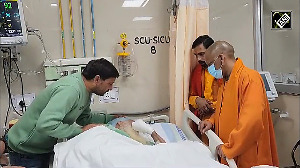The US House of Representatives on Friday ordered a vote on a resolution seeking to implement the legislation on the Indo-US civilian nuclear deal after a general discussion during which Republicans welcomed the agreement and Democrats voiced mixed feelings.
The voting was ordered following a demand by a Democratic member.
Shortly after the House convened Friday morning, Republican Congressman Robert Bishop of Utah initiated a debate on House Resolution 1101, waiving points of order against the Conference report to accompany the bill to exempt from certain requirements of the Atomic Energy Act of 1954 the proposed nuclear cooperation agreement with India.
Bishop called the legislation not only an excellent bipartisan bill but also fitting in that the bill is being named after Henry Hyde, the senior Republican from Illinois and Chair of the House International Relations Committee who is retiring from the Chamber this year.
The Conference Report, Bishop said, is 'focussed,clean and without extraneous issues' and the legislation as a whole reflects the sentiments of the House and the Senate and having greater control on non proliferation activities.
Democrat from New Jersey Frank Pallone said the United States 'has an important strategic partnership with India and an important stake in the stability of South Asia...We need India as a strategic ally'.
However, Ohio Democrat Dennis Kuchinich opposed the proposed legislation arguing that the Bush administration 'does not have a commitment to non-proliferation' and that there has to be consistency on its part as on one hand it is vehemently opposed to nuclear programmes in Iran and North Korea and on the other hand giving a 'blessing' to India.
"This is a dangerous time to be approving such legislation," Kucinich said, adding the impact of the law on the rest of the world would have to be taken into account.
The Henry J Hyde United States-India Peaceful Atomic Energy Cooperation Act of 2006 giving stamp of approval to nuclear commerce between India and the US also came under criticism from David Wu, the Democrat from Oregon.
He said supply of nuclear fuel to India would enable it to free up its domestic reserves to pursue the buildup of its nuclear arsenal. He said the legislation will impact the nuclear weapons policies of China and Pakistan.
Support to the legislation came from Texas Democrat Sheila Jackson Lee who called it 'an important step' that helps the United States have India in the 'family of non- proliferation' and that the legislation to be passed in the House is the 'right start'.
However, strident comments came from Massachussetts Democrat Edward Markey whose consistent opposition to the deal has been well known since the time the initiative was announced in July 2005.
"It is a historic mistake... that will come back to haunt the United States and the world," Markey said, adding the legislation is basically telling India that it did not have to stay with the norms of the Non Proliferation Treaty.
He also touched on one of his themes -- diversion of nuclear fuel by India to build up its nuclear arsenal from an estimate of about seven bombs a year to between 40 and 50 bombs.
"This is comical. The end of the non proliferation regime is debated for an hour... This is a going-away present to the Bush administration," Markey said.
"We are going to come back and rue this day. This is an era of historic hypocrisy," Markey added.
On Thursday night, the Rules Committee voted to waive all points of order against the Conference Report and against its consideration and said the Conference report shall be considered as read.






 © 2025
© 2025